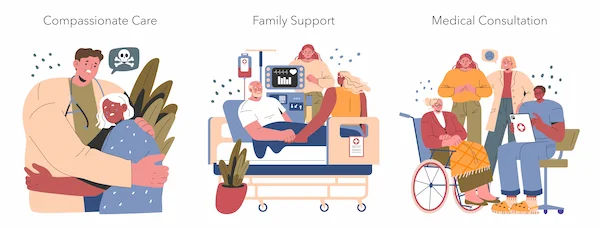Understanding Lymphocytes
Understand the role of lymphocytes in your immune system, their types, functions, and what abnormal levels may indicate about your health.

Written by Dr. Vasanthasree Nair
Reviewed by Dr. Rohinipriyanka Pondugula MBBS
Last updated on 13th Jan, 2026

Introduction
Imagine your body is a fortress. Every day, it’s under silent siege from millions of invaders: viruses trying to give you a cold, bacteria attempting to cause an infection, and even rogue cells that could become cancerous. Standing guard against these threats is a highly specialized army: your immune system. And the special forces operators of this army? Lymphocytes. These tiny but mighty white blood cells are the masterminds and executors of your body’s defense strategy, offering both immediate protection and long-term immunity. But what exactly are they, how do they work, and what does it mean if your levels are too high or too low? This guide will demystify these critical cells, breaking down the complex science into actionable knowledge you can use to better understand your health. We’ll explore their different types, how they’re measured, and what you can do to keep your personal defense force in peak condition.
What Are Lymphocytes, Exactly?
Let’s start by breaking down what these vital immune cells really are:
White Blood Cells: The Foundation of Your Immune System
To understand lymphocytes, we first need to talk about white blood cells, or leukocytes. Think of them as your body's entire military. Their sole purpose is to protect you. This military has different branches; some are like infantry (neutrophils) that swarm and engulf invaders, others are like intelligence agents (lymphocytes). Lymphocytes are a specific type of white blood cell, making up about 20% to 40% of the total white blood cell count in a healthy adult. They are unique because they are the only cells capable of recognizing specific antigens, the unique "badges" that identify every pathogen and foreign substance.
The Lymphocyte's Mission: Seek and Destroy
The core mission of all lymphocytes is adaptive immunity. This means they don’t just attack anything foreign; they learn, adapt, and remember. When a new pathogen enters your body, your lymphocytes launch a targeted response. After the threat is neutralized, they create a "memory" of it. This is why you typically only get diseases like chickenpox once; your memory lymphocytes are on standby, ready to launch a devastatingly fast and effective attack if that same virus ever returns. This incredible process is also the fundamental principle behind vaccinations.
Consult a Haematologist for the best advice
Meet the Special Forces: The Different Types of Lymphocytes
Your lymphocyte army has three main special forces units, each with a distinct and critical role. Understanding the difference between B and T cells and their comrades is key to appreciating how your immune system works.
B Cells: The Intelligence and Weapons Factory
B cells (B lymphocytes) are developed in the bone marrow. They are responsible for humoral immunity, which essentially means they manage the antibody response. They are the intelligence agents that identify a threat and the weapons manufacturers that produce the solution.
How B Cells Create Antibodies
When a B cell encounters its specific antigen, it becomes activated and rapidly clones itself. Most of these clones become plasma cells, which are essentially antibody factories. These antibodies are like targeted missiles. They swarm the pathogen, binding to it and marking it for destruction by other immune cells. They can also neutralize toxins and prevent viruses from entering your cells.
The Role of Memory B Cells
Not all activated B cells become plasma cells. Some become memory B cells. These long-lived cells patrol the body for years, sometimes decades, holding the blueprint for the antibody that defeated the original invader. This is what provides lifelong immunity to many diseases.
T Cells: The Special Ops Commandos
T cells (T lymphocytes) mature in the thymus gland. They are responsible for cell-mediated immunity, meaning they directly engage and destroy infected or cancerous cells. They are the hands-on commandos of your immune system.
Helper T Cells: The Generals of the Immune Response
Often called CD4+ cells, these are the commanders. They don't destroy threats themselves but are essential for coordinating the entire immune response. They activate B cells to make antibodies, call in other white blood cells, and direct Cytotoxic T cells to their targets. The HIV virus specifically attacks Helper T cells, which is why it cripples the entire immune system.
Cytotoxic T Cells: The Direct Assassins
Also known as CD8+ cells or "killer" T cells, these are the frontline soldiers. They directly seek out and destroy cells that have been infected by a virus or have become cancerous. They identify these compromised cells and trigger them to self-destruct in a process called apoptosis.
Regulatory T Cells: The Peacekeepers
This crucial unit prevents the immune system from overreacting. They suppress the activity of other immune cells once an infection is cleared, helping to prevent autoimmune diseases where the body attacks its own tissues.
Natural Killer (NK) Cells: The Rapid Response Unit
Natural Killer cells are part of the innate immune system but are classified as lymphocytes. They are the rapid-response unit that doesn't require the same specific activation as B and T cells. They quickly identify and destroy stressed cells, such as virus-infected cells or cancer cells, providing a critical first line of defense.
How Are Lymphocytes Measured? Understanding Your Blood Test
Blood tests provide key insights into lymphocyte levels and what they mean for your health.
The CBC Test: A Snapshot of Your Health
The complete blood count (CBC) test is one of the most common blood tests ordered by doctors. It provides a detailed breakdown of the cells in your blood. The "CBC with differential" is what specifically measures your lymphocyte count, giving both an absolute number and a percentage of your total white blood cells.
What's a Normal Lymphocyte Count?
A normal absolute lymphocyte count for adults is typically between 1,000 and 4,800 cells per microliter of blood. In terms of percentage, they usually make up 20% to 40% of your total white blood cell count. It's important to note that "normal" ranges can vary slightly between different laboratories.
Lymphocyte Percentage vs. Absolute Count
Your doctor will look at both numbers. For example, if your overall white blood cell count is very high due to a bacterial infection (which increases neutrophils), your lymphocyte percentage might be low, even if the absolute number is normal. This is why context is everything.
Get Your Health Assessed
Conclusion
Your lymphocytes are nothing short of biological marvels. This intricate network of B cells, T cells, and NK cells works in flawless, coordinated harmony to protect you from a world full of microscopic threats. They provide not just immediate defense but also a sophisticated memory that forms the basis of immunity. Understanding what they are and how they function empowers you to be a more informed participant in your health. While this article provides a foundation, it's not a substitute for professional medical advice. If you have concerns about your immune health or are trying to interpret blood test results, the most important step is to have a detailed conversation with your doctor. They can help you understand your numbers in the context of your overall health. Take this knowledge, support your body's natural defenses with healthy habits, and always partner with your healthcare provider to ensure your internal army remains strong and vigilant.
Consult a Haematologist for the best advice
Consult a Haematologist for the best advice

Dr.sanchayan Mandal
Medical Oncologist
17 Years • MBBS, DrNB( MEDICAL ONCOLOGY), DNB (RADIOTHERAPY),ECMO. PDCR. ASCO
Kolkata
Dr. Sanchayan Mandal Oncology Clinic, Kolkata

Dr Abilash Jain
General Physician/ Internal Medicine Specialist
12 Years • MBBS,DNB(FM),MNAMS,FIAMS,CCGMG(GERIATRICS),DGM (GERIATRICS),PGCD(DIABETES,BOSTON UNIVERSITY),FID(DIABETICS UK)CCEPC(PALLIATIVE CARE),CCCC(CRITICAL CARE)
Visakhapatnam
Apollo Clinic Vizag, Visakhapatnam

Dr. E Prabhakar Sastry
General Physician/ Internal Medicine Specialist
40 Years • MD(Internal Medicine)
Manikonda Jagir
Apollo Clinic, Manikonda, Manikonda Jagir
(150+ Patients)

Dr. Ramalinga Reddy
General Physician
5 Years • MBBS MD General medicine
Bengaluru
PRESTIGE SHANTHINIKETAN - SOCIETY CLINIC, Bengaluru

Dr. Sushith C
General Physician
2 Years • MBBS
Bengaluru
PRESTIGE SHANTHINIKETAN - SOCIETY CLINIC, Bengaluru





